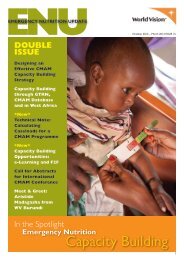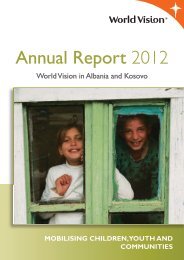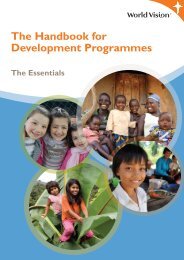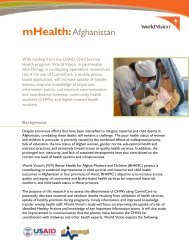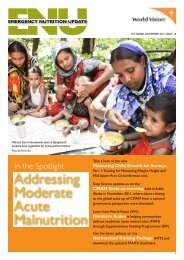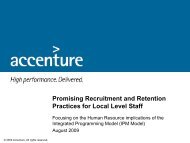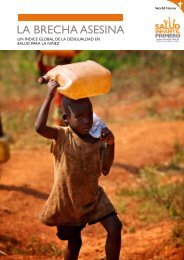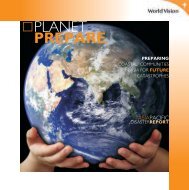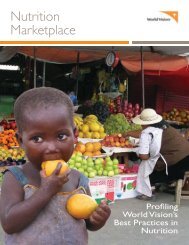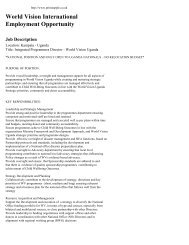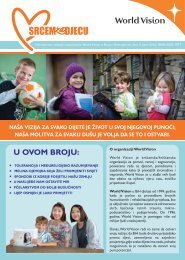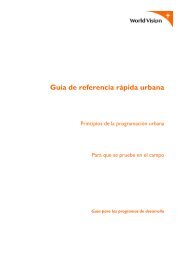Channels of Hope for Gender - World Vision International
Channels of Hope for Gender - World Vision International
Channels of Hope for Gender - World Vision International
You also want an ePaper? Increase the reach of your titles
YUMPU automatically turns print PDFs into web optimized ePapers that Google loves.
<strong>Channels</strong> <strong>of</strong><br />
<strong>Hope</strong> <strong>for</strong> <strong>Gender</strong><br />
Affirming the Worth and Dignity <strong>of</strong> Women and Men<br />
Introduction<br />
Faith leaders are <strong>of</strong>ten amongst the most influential members <strong>of</strong> the communities in which <strong>World</strong> <strong>Vision</strong> Solomon<br />
Islands works. Their personal beliefs and values can inspire an entire community to care <strong>for</strong> one another and to take<br />
responsibility and collective action over issues that concern them. However ill-conceived theologies can contribute<br />
to negative gender messaging resulting in stigmatization and discrimination based on one’s gender or HIV status.<br />
Such messages contradict the calling <strong>of</strong> faith leaders to provide loving care and safe spaces to all members <strong>of</strong><br />
society without prejudice. The <strong>Channels</strong> <strong>of</strong> <strong>Hope</strong> model equips faith and community leaders to individually and<br />
collectively respond to core issues that compromise the well-being <strong>of</strong> children, their families and communities,<br />
whether these be health or gender injustices. These partnerships with faith leaders are a step towards positive<br />
social trans<strong>for</strong>mation.<br />
What is the ‘<strong>Channels</strong> <strong>of</strong> <strong>Hope</strong>’ approach?<br />
The <strong>Channels</strong> <strong>of</strong> <strong>Hope</strong> approach is more than just<br />
training or education, it is the trans<strong>for</strong>mation <strong>of</strong> ideas<br />
and subsequently <strong>of</strong> behaviour. Training is designed to<br />
engage with participants in a manner that challenges<br />
their attitudes and knowledge, inspires a change <strong>of</strong><br />
heart and behaviour, and motivates a sustained and<br />
effective response to issues that threaten the wellbeing<br />
<strong>of</strong> communities.<br />
People trained in the <strong>Channels</strong> <strong>of</strong> <strong>Hope</strong> approach are<br />
given tools so they can return to their communities to<br />
mobilise their faith congregations and other groups to<br />
make a positive change. They instigate the <strong>for</strong>mation<br />
<strong>of</strong> volunteer groups that begin to sensitize<br />
communities to gender injustice or HIV and AIDS. The<br />
same groups also <strong>for</strong>m networks that support the most<br />
vulnerable in their communities.<br />
How did <strong>Channels</strong> <strong>of</strong> <strong>Hope</strong> <strong>for</strong> <strong>Gender</strong><br />
emerge?<br />
<strong>Channels</strong> <strong>of</strong> <strong>Hope</strong> <strong>for</strong> <strong>Gender</strong> emerged from <strong>World</strong><br />
<strong>Vision</strong>’s work with church and community leaders in<br />
HIV & AIDS prevention, care and advocacy. Statistics<br />
and realities from the field depicted a higher infection<br />
rate <strong>of</strong> women in comparison to men. Studies<br />
attributed this disparity to a number <strong>of</strong> factors,<br />
including gender injustice. Un<strong>for</strong>tunately, religion and<br />
culture were identified as factors that tend to subtly<br />
discriminate against women and girls rendering them<br />
unable to have control over choices regarding their<br />
sexual and reproductive health. Consequently the need<br />
“If our business is to fight poverty, then we must act<br />
in mending broken relationships. Relationships break<br />
largely because <strong>of</strong> gender relations gone wrong….<br />
There is no organization that is as well placed to deal<br />
with this than we are” – Robert Kisyula, WVDRC<br />
National Director.<br />
“CoH <strong>for</strong> <strong>Gender</strong> is biblical, simple and interactive.<br />
The management team and I are convinced that this<br />
tool is appropriate <strong>for</strong> community gender<br />
mobilization”- Tenagne Lemma, WV Ethiopia<br />
National Director<br />
“I had six daughters be<strong>for</strong>e I had a son. At birth, I<br />
named him “Consolation,” because in my culture girls<br />
are not valued as much as boys. I attended a CoH <strong>for</strong><br />
<strong>Gender</strong> workshop and my view changed, making me<br />
recognise that all children are a gift from God. I<br />
changed my son’s name to affirm that I value all my<br />
children equally. All <strong>of</strong> them are a ‘consolation’ to us,”<br />
-Pastor Israel Mwanabute (DRC).<br />
“Having attended this workshop, I am fully convinced<br />
that the churches and communities in Ethiopia need<br />
to take time to review the place and function <strong>of</strong><br />
women in the family and society. This tool is lifechanging”-<br />
Pastor Getu WVE Board Member and<br />
leader <strong>of</strong> the Evangelical Churches’ Fellowship<br />
<strong>of</strong> Hawassa, Ethiopia.<br />
CoH Workshop held in Honiara on the 8 th August 2012 © WVSI
<strong>Channels</strong> <strong>of</strong><br />
<strong>Hope</strong> <strong>for</strong><br />
<strong>Gender</strong><br />
Key Partners<br />
and<br />
Stakeholders<br />
<strong>World</strong> <strong>Vision</strong><br />
Solomon Islands<br />
partners with a<br />
variety <strong>of</strong><br />
government<br />
agencies, NGOs,<br />
community groups<br />
and churches.<br />
Churches and<br />
Pastors in<br />
Honiara<br />
Solomon<br />
Islands<br />
Christian<br />
Association<br />
(SICA)<br />
Chiefs and<br />
Community<br />
Leaders<br />
Ministry <strong>of</strong><br />
Women, Youth<br />
and Children<br />
Affairs<br />
(MWYCA)<br />
In <strong>Channels</strong> <strong>of</strong> <strong>Hope</strong> <strong>for</strong> <strong>Gender</strong> (adapted from Elaine Pountney’s book<br />
entitled “Reclaiming the Wonder <strong>of</strong> Sexuality – a Biblical Understanding <strong>of</strong><br />
Male and Female”), <strong>World</strong> <strong>Vision</strong> has developed an innovative tool that<br />
helps explore gender biblically while maintaining sensitivity to pertaining<br />
cultures. This methodology is participatory, inviting participants into the<br />
kind <strong>of</strong> dialogues that identifies and affirms positive aspects <strong>of</strong> culture and<br />
pertaining biblical presuppositions while challenging negative attitudes and<br />
practices on gender. This tool has been piloted with culturally and<br />
theologically diverse church and community leaders in Ethiopia, The<br />
Democratic Republic <strong>of</strong> Congo and Uganda. The approach has become a<br />
preferred community mobilisation tool not only <strong>for</strong> gender issues but also<br />
<strong>for</strong> Child Protection and Advocacy and Justice <strong>for</strong> Children in the Southern<br />
African Region. <strong>Channels</strong> <strong>of</strong> <strong>Hope</strong> <strong>for</strong> <strong>Gender</strong> has now been integrated into<br />
an action-learning framework <strong>for</strong> <strong>Gender</strong> Based Violence response in the<br />
Solomon Islands.<br />
Our <strong>Gender</strong>- Based Projects<br />
This project provides church leaders with improved capabilities <strong>for</strong> working<br />
with their church groups to address and reduce <strong>Gender</strong> Base Violence in<br />
their communities.<br />
Honiara Community <strong>Vision</strong> <strong>for</strong> Change<br />
The Honiara Community <strong>Vision</strong> <strong>for</strong> Change project is aimed at reducing<br />
gender-based violence in five communities in Honiara by 2015. The five<br />
targeted communities in Honiara are, Sun Valley Community, Burns Creek<br />
Community, Fulisango Community, Lord Howe Community and White River<br />
Community. The project will run <strong>for</strong> three years, it began in May 2011 and<br />
will end in September 2014.<br />
The Honiara Community <strong>Vision</strong> <strong>for</strong> Change Project is funded by <strong>World</strong> <strong>Vision</strong><br />
Australia and the Australian NGO Cooperation Program (ANCP).<br />
Legal Agents:<br />
Public Solicitors<br />
Office, SI Bar<br />
Association and<br />
Director <strong>of</strong><br />
Public<br />
Prosecution<br />
Service<br />
Providers:<br />
Health Care,<br />
Social Welfare<br />
and Police<br />
Nancy and her 4 year old daughter sit under their<br />
house in Sun valley community, Honiara © WVSI



